The attached article is both a novelty and an attempt. By popular request, we are publishing my essay „Chinas Problem heißt Xi Jinping“ here for the first time as an article on “Der Rikscha-Reporter” in English. We have used DeepL.com as a translation tool. But „The Rickshaw-Reporter“ can only get better with the active contribution of its readers. So, if something in the translation below sounds strange or is fundamentally wrong, please let us know at: info@juergenkremb.com. We will then correct it as soon as possible.
Imagine the following scene. Sometime in the 1980s, it is the height of the Cold War between the USA and the USSR, NATO and the Warsaw Pact. On a busy Friday afternoon, a squadron consisting of 20 bombers and fighter pilots climbs from the US airbase Ramstein in the Palatinate. Four of them nuclear bombers, although it remains unclear whether the atomic destroyers of the skies on this mission carry nuclear warheads on board or just dummies. The task force flies towards the east, occasionally penetrating GDR’s airspace over the Baltic Sea and moving rapidly towards the Soviet Baltic.
What would have happened back then? It’s hard to recapitulate, but perhaps „because of a provocation by the bellicose West,“ as the communist press of the Eastern Bloc states would have portrayed it afterwards, „the Third World War would have broken out“. Provided there had still been a world afterwards that could have been reported on.
„Fortunately,“ one might say in retrospect, there were never politicians and generals who risked such irresponsible actions. Far from it, even worse. They exist again. Rather him, residing in Beijing’s Zhongnanhai, the seat of the Chinese Communist Party’s Politburo. For it was precisely such a fire-threatening provocation that Xi Jinping, in his capacity as State and Party leader of the People’s Republic of China (PRC) and its superior cadre party, the CCP, initiated last Friday in March this year.
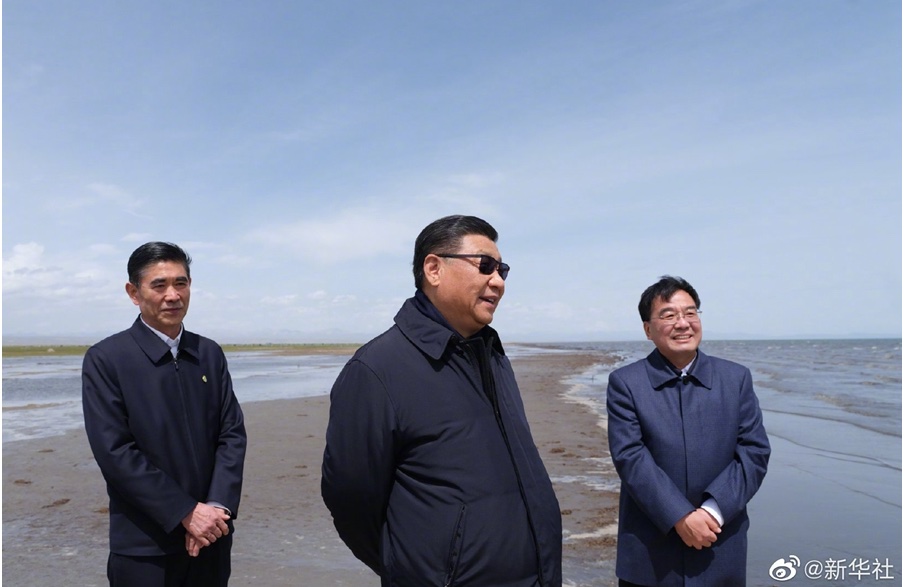
In the largest incident of its kind to date, more than 20 fighter jets of the Chinese armed forces entered Taiwan’s airspace and practiced attacking – with nuclear warheads – US naval forces cruising in the South China Sea. The catalyst for this act of hooliganism had been that a few hours earlier the USA had signed an agreement with Taiwan for the „coastal protection“ of the island nation.
Under the Taiwan Relations Act, Washington is obliged to provide military support to the democratic island republic in the event of an attack by the PRC. The simplest thing, of course, would be for Washington to station troops on Taiwan. However, this is not politically feasible in Congress, at least not yet. This is because China regards the island as part of its communist regime and would regard the stationing of US troops there as a declaration of war. The USA is still reluctant to do so.
China, however, thinks very little of such considerations. The Xi regime is seeking conflict with the West with actions that are becoming more dangerous by the day. Not only with the USA. There is flaming against Australia because a Chinese spy was exposed there or because Canberra was the first government to demand a more detailed investigation into the origins of the coronavirus, which originated in the Chinese megacity of Wuhan.
Then, China’s wolf warriors in diplomatic garb are rushing against Canada’s Prime Minister Justin Trudeau, Chinese prosecutors are even dragging Canadian citizens to court as political hostages. The reason: an extradition request by the USA for a prominent Chinese businesswoman who is staying in Canada. And when the EU imposes velvet sanctions on just four Chinese officials for human rights violations in Xinjiang – not even the provincial governor was among them – Beijing rolls into the EU Parliament with a whole squadron of sanctions tanks, the likes of which have never been seen there before.
This sounds like China’s Versailles Treaties, a disgrace of history that dates back 160 years and now has to be eradicated.
On top of that, entry bans were imposed on European think tanks and academics. The credo: Europe sanctions human rights violations, the Xi regime punishes free thinking and wants this dictum to take root worldwide as dangerously as the spikes of the Corona-virus released in China in the bodies of its victims.
As if all this were not enough to permanently damage relations, the internet mob is also unleashed on Western companies for even daring to remark that they do not use cotton from Chinese prison camps in China’s Western Province.
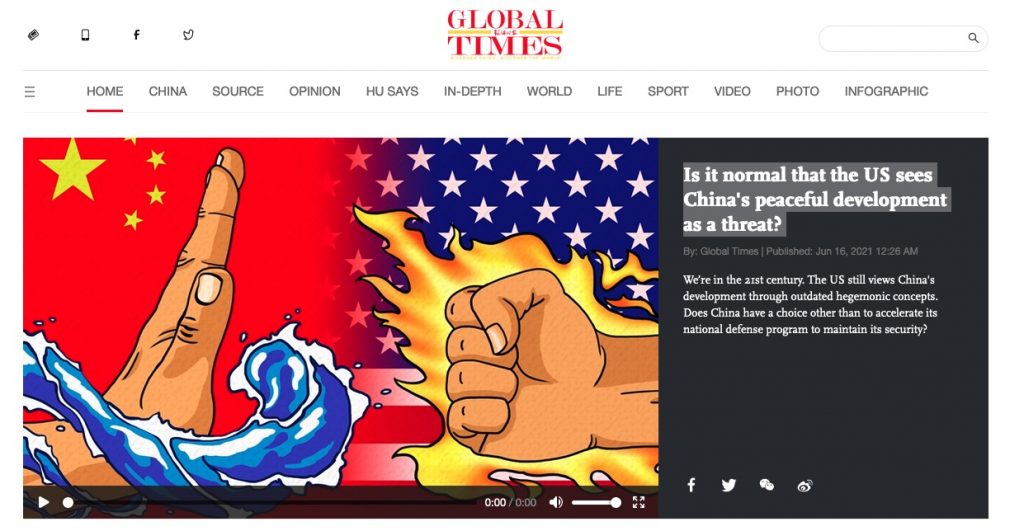
Now the Xi-KP wants its own people to believe that the foreigners behaved like the Allied Army of 1860, which razed the imperial summer palace of Yuanmingyuan in the Second Opium War. This sounds like China’s Versailles Treaties, a disgrace of history that dates back 160 years and must now be eradicated. And with military means.
What leader Xi commands – who, by the way, must be called „Papa Xi“ and his wife „Mama Peng“ in China – has meanwhile not only taken on neo-fascist characteristics, but also fulfils all 14 criteria with which the British author Laurence W. Britt re-sorted fascism in 2003. China’s communism is actually national socialism of the classic variety.
Incidentally, the German, very CCP-friendly sinologist Wolfgang Kubin already feared that the idea of the Wolf Warriors could have a profoundly fascist mindset inherent in it at the origins of the movement.
What is now considered a label for poorly trained diplomats, obviously without good breeding, to shout down and tweet down their political adversaries in the West in a manner that is no longer suitable for the young, actually originated in the book of a Chinese dissident. Not only did I have the pleasure of being the first to write about the author, who at the time went by the pseudonym Jiang Rong for security reasons. He was also one of my best friends in China.
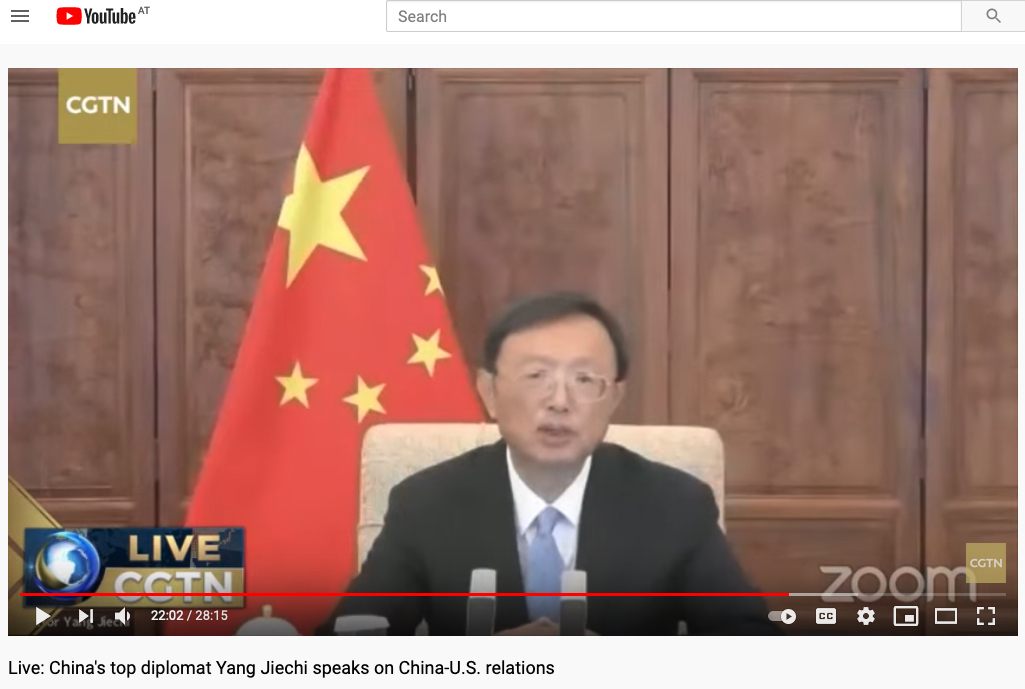
A staunch trade unionist, Lü Jiamin, his real name, was imprisoned after the 1989 Tiananmen massacre and is truly above suspicion of having right-wing totalitarian tendencies.
In his novel Wolf Totem Lü tells his own life story, when he, like many of his peers, was sent to the countryside for proletarian re-education during the Cultural Revolution (1966-76).
Lü was shipped to nomads in Inner Mongolia, where he tried to tame a wolf but failed because wolves cannot be domesticated. This touching animal-human story earned the dissident Lü, who is married to the successful author Zhang Kangkang, worldwide literary fame. His book soon became a million-seller and was also filmed in the West.
In an essay appended to the story, Lü discusses from his experience as a regime critic why the Chinese no longer have to be lambs but wolves if they want to free themselves, meaning „democratize“. It speaks for the perfidy of the communist propaganda apparatus to turn this into a national socialist, deeply xenophobic battle rhetoric against the West.
But under Xi Jinping, who has been in power since 2012, Lü Jiamin’s book would also no longer be conceivable. Even China experts and sinologists are shocked at how the state and party leader has transformed the country from a moderate communist dictatorship into a one-man autocracy with unprecedented mind control of its 1.4 billion subjects.
And to describe China before Xi as a moderate communist dictatorship is more than a polite euphemism. For it was also the country that had a good 3.000 demonstrators massacred with live ammunition in the middle of its capital in 1989. But besides the prosperity that reform had brought to many Chinese before the Xi era, moderate critical discourse was also possible in a few media outlets and in private. Under Xi Jinping, however, nothing of this has remained.
There is only one God-like in China and that is state and party leader Xi Jinping.
Hardly anyone in the democratic West can imagine the abstruse forms this has taken. The fact that the children’s book character Winnie-the-Pooh Bear was banned from China’s strictly controlled social media at the beginning of Xi’s reign because in the eyes of the CCP-censors it would be tantamount to a disrespectful description of the party leader was smiled away with a frown in the West.
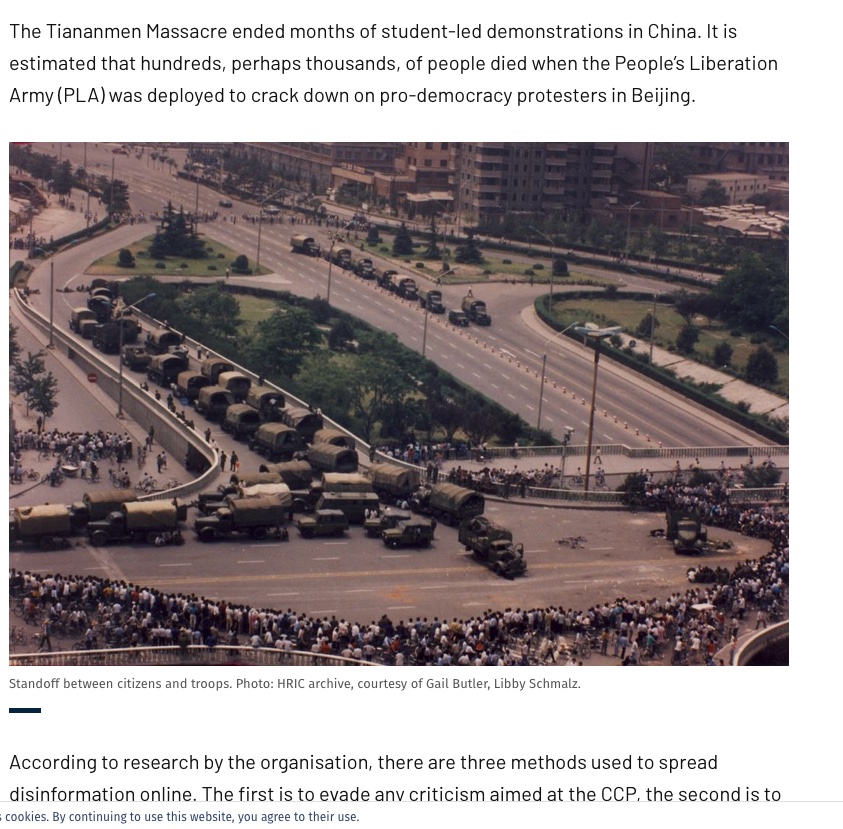
Also, the fact that under Xi Jinping, words, names and labels such as Dalai Lama, Tiananmen Incident of 4 June 1989 (Tiananmen Massacre anyway), Wei Jingsheng, Chinese Nobel Peace Prize laureate Liu Xiaobo who died of cancer in prison hospital, and anything ever critical of the Chinese Communist Party (CCP) were no longer to be found on the tightly controlled Chinese internet. (Also, the Chinese name of the author of these lines and Wei Jingsheng biographer).
After that, terms like the Nobel Prize, the Chinese Republic founded in 1911 and the word “mainland” were put on the index. Because the latter is used in democratic Taiwan to describe the Chinese communist’s state. Finally, the entire year 1989, the year of the student protests, disappeared from Baidu Baike (China’s Wikipedia).
Now, hundreds of thousands of trolls and censors, who control every character in daily newspapers and especially the social media, even erase descriptions like a „god-like voice“. For there is only one God-like in China and that is state and party leader Xi Jinping. Recently, the Chinese character for emerald green 翠(pronounced „cui“) was banned.
Why? Here’s the explanation: The character for emerald green (翠) contains two so-called phonetic radicals, which, pronounced differently, also stand for the party leader’s surname 习 (surname: Xi) 近平 („first“ or call name: Jinping). But under the two phonetic radicals in the „head“ of the character „cui“ (翠), there is another character built in, which stands for „die“ and „perish“.
Therefor using „cui“ (翠) for emerald green on the Chinese internet, according to the sick logic of the censors, would mean wishing something bad on the party leader. And that’s just one example of the now hundreds, if not thousands, of banned characters or language gimmicks.
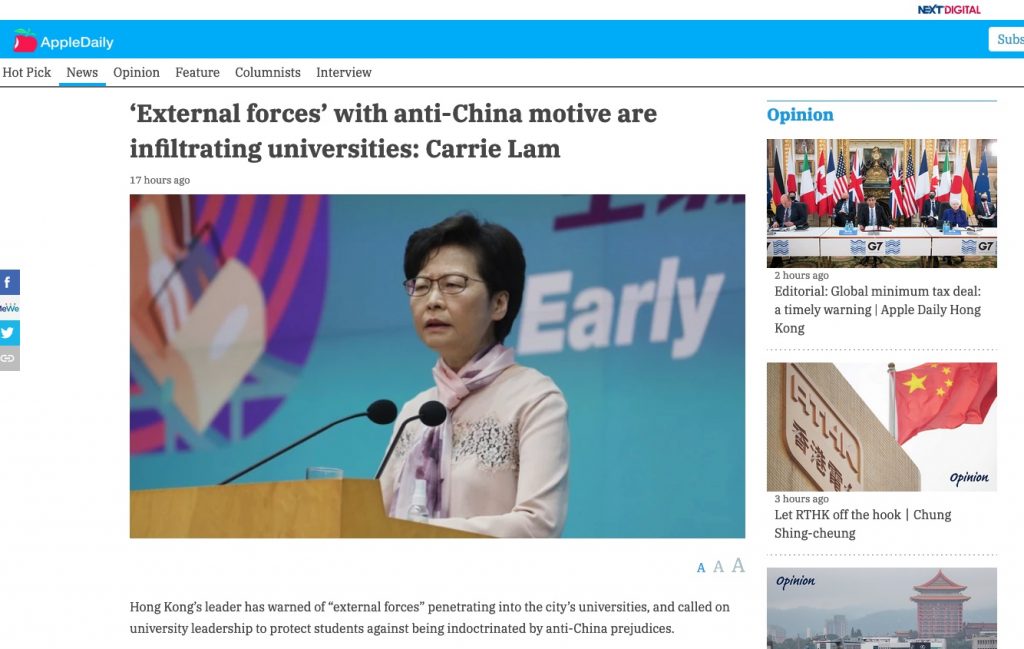
In Hong Kong, school textbooks are currently being trimmed to „patriotic“ standards. This means, for example, that terms like „Republic of China“ are no longer to be found there either.
But this kind of madness no longer stops at the borders of the People’s Republic of China. And in South Korea, they are now seriously considering closing all Confucius Institutes. The reason: too many parents had complained that the Chinese language institute wanted to teach their children a history of their own country dominated by China. At best, the Korean peninsula still plays a role as a tributary principality on the edge of the Chinese empire.
But can that work? No, certainly not. As history has proved many times, such provocations may fuel the domestic public into ever new tirades of hatred and drive them into an ever-deeper frenzy of nationalist delusion. At some point in human history, and also in China’s history, such dangerous manoeuvres of pathological persecution mania, coupled with nationalism and xenophobia, always got bloody out of hand.
And then? „Cultural Revolution“, „Great Leap Forward„, were the names of the campaigns of mass delusion that ended in a bloodlust in the history of communist China. But perhaps worse? Sarajevo sends its regards, or rather the invasion of Poland by Adolf Hitler in August 1939.
What does Xi want? World domination is to be feared. Peter Jennings, former Assistant Secretary of State for Strategy in the Australian Department of Defence, sums it up as follows: „At the global level, the CCP aspires to become a strategic leader that sets its own rules for how it conducts itself in the international arena. Beijing is no longer prepared to accept the role of passive observer assigned to it after the last world war, even though it has perhaps benefited most from this system itself.“
Even renowned sinologists are not above putting down any critical discussion of China as „China-bashing“.
For example, those who closely followed the internet-chats surrounding the appearance of the two top Chinese politicians Yang Jiechi and Wang Yi with US Secretary of State Antony Blinken in Anchorage, Alaska in Chinese cyberspace, repeatedly came across chat posts like this: „We have already reached the leadership of the world.“ Or: „We are number one.“ And: „China lead the world.“
There is no independent internet in China. Such appearances are orchestrated down to the last detail by the huge propaganda apparatus of the Chinese Communist Party.
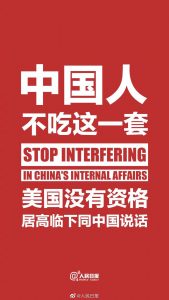
China’s propagandists call such actions a „war for international opinion supremacy“. According to research by the Australia Strategic Policy Institute, China is increasingly reaching an international audience through Twitter and Facebook. The English-language channel of state television has 115 million followers on Facebook. Last year, its reports on Xinjiang, mostly about allegedly happy Uighurs, generated 5.8 million likes.
Mareike Ohlberg of the German Marshall Fund of the United States recently described how extensive the efforts of even local Chinese authorities are to compete in international opinion. She evaluated a tender for an automated online commenting system issued by the local security authority of Tieling, a city of three million people. It talked about paid comments on a total of 1.000 Facebook, Twitter, YouTube accounts and tens of thousands of Weibo accounts. The possible operator should be able to generate more than 1.000 comments per second. In contrast, Vladimir Putin’s troll army seems to be nothing more than a brigade of digital dwarfs.
Such automated brainwashing has long since taken hold in Western countries as well. Even renowned sinologists are not above putting down any critical discussion of China as „China-bashing“. (In German only.) But the basic rule is: the less the army of foreign claqueurs speaks Chinese, let alone knows how to read it, the more they fall for Chinese propaganda.
They let themselves be lured by it with paid essays and first-class flights to supposedly international conferences in China. There they have to serve as useful idiots who praise the Communist Party in the Chinese domestic media. Unfamiliar with the local language, they are in any case unable to check how their quotes and essays are sometimes grotesquely rephrased – always for the benefit of the leader Xi Jinping.
In its rise to become the leading world power in the ideological, military and economic context, China is willing to use any means – to lie, intimidate, deceive and cheat. What cannot be created from one’s own abilities is looted, stolen or cribbed from abroad.
Most of the leaders and functionaries have lost any moral compass, if they ever had one at all as a generation raised in the carnage of the Cultural Revolution. All this is to be concealed by constant, insane bans and Kafkaesque language regulations and by declaring the most absurd things state secrets.

Even Hong Kong’s National Security Law now allows for punishment of offences against China’s state interests „committed abroad„.
„Foreign academics, journalists and entrepreneurs, for example, can be detained on entry to China if they are seen by Beijing as endangering Hong Kong’s security abroad,“ writes Kristin Shi-Kupfer on Manager Magazine Online. „In the current draft of the new data security law, there is provision to hold foreign institutions and governments accountable if the Beijing government believes they discriminate against Chinese businesses.“
This would mean that the writing, publishing and sharing of this analysis could be punished as a criminal offence and the author could be taken into custody at the next transit in Hong Kong airport.
Just as radical Islamists like to claim that Islam is a religion of peace, even when the blood of their victims is dripping through their fingers, it is part of the Chinese agitprop machinery to sing the praises of the peace-loving and solidary Chinese nation. But sullied by their own hubris and the frenzy of nationalism, communist cadres are increasingly blabbing on the net. Like this one:
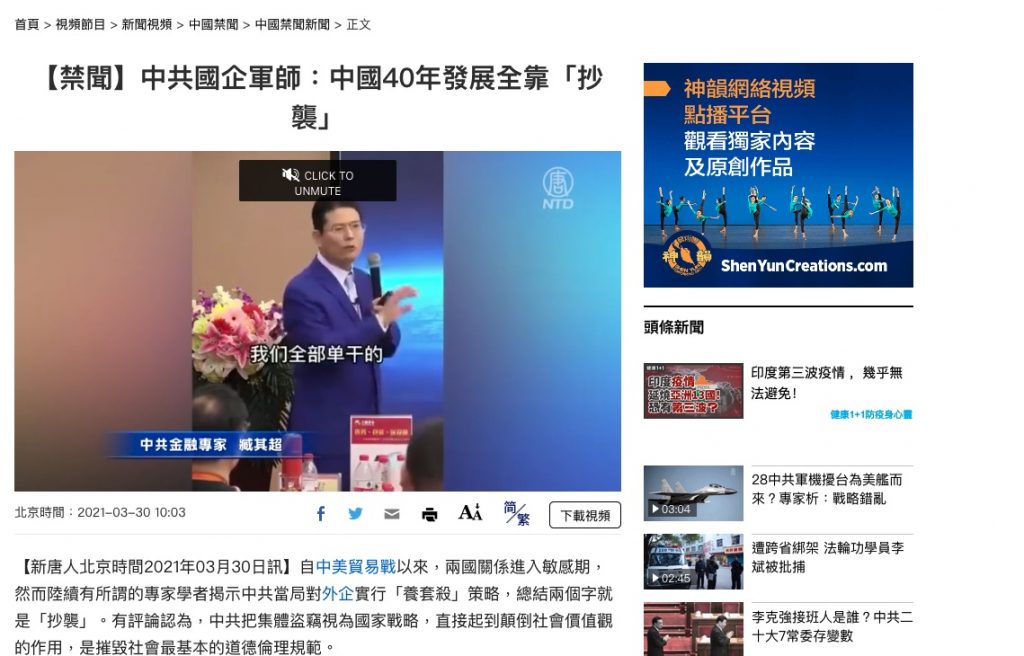
In front of a visibly amused audience, the local cadre tells in Chinese what the Communist Party’s strategy with foreign countries has been: „We brought them into the country to copy and steal their technology, now we are throwing them out again and breaking them.“ Or this renowned professor told in front of running cameras how they had bribed politicians and businessmen in the USA to influence American politics.
Since the CCP came to power, it has used these means first to crush any domestic opposition among its own citizens and also opposition from liberal minds within its own ranks. Then the CCP officials have robbed minority peoples of their identity and murdered or expelled their leaders. The list of campaigns and victims is long: „Campaign against the rightist“, „Great leap forward“, „Cultural revolution“, „Struggle against bourgeois liberalism“. The names: Liu Shaoqi, Hu Yaobang, Zhao Ziyang, Wei Jingsheng, Wang Dan, Liu Xiaobo and millions more unknown.
The same pattern is now being followed by Xi Jinping’s „New Silk Road“ initiative worldwide. The goal is not world peace, but the integration of smaller nations into the Chinese economic system and the CCP’s system of rule. First, poorer countries are fed with supposedly cheap economic development and infrastructure measures for bridges, roads and ports. Usually, a kickback to corrupt local elites is involved. Examples: Sri Lanka, Montenegro, Kazakhstan, Tanzania, but also Serbia and Hungary.
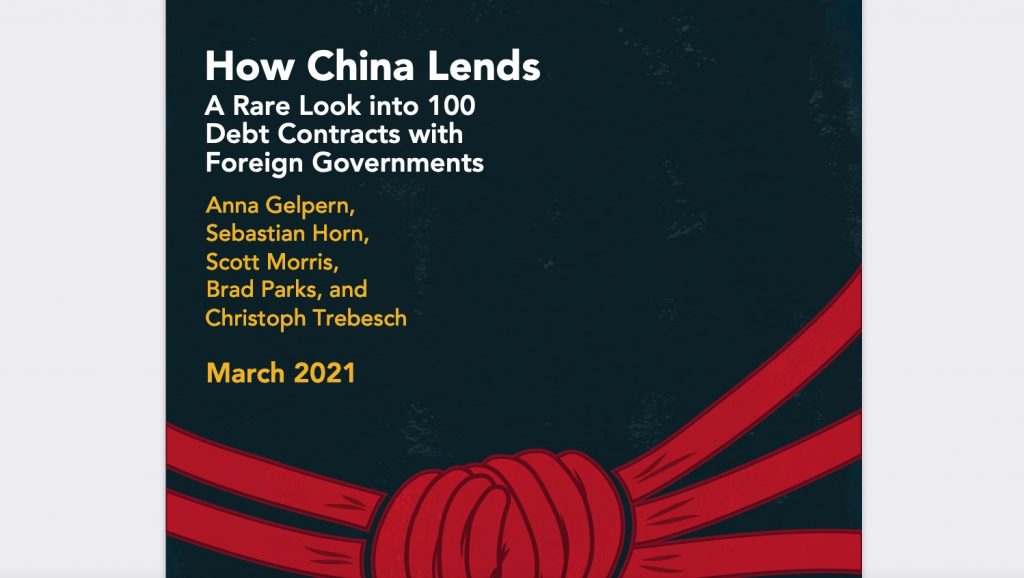
When the financing rates, which are far above the usual market rates, can no longer be serviced, the prime pieces of local infrastructure become the property of Chinese companies or the People’s Republic of China. This system, by the way, is comparable to the tribute system for China’s neighboring countries and other barbarians in imperial times. Except that back then the barbarians carried gold, tea, tropical fruits and giraffes to Beijing. Today it is commodities, dollars and renminbi, the Chinese „people’s dollar“ currency.
China has become an open, aggressive hegemonic power. But does Xi seriously believe he can impose his social system on other countries, lie to foreign politicians and they will eventually carry giraffes to his imperial court? He could send the cavalry to Piraeus or even to Budapest and Bucharest? Is Xi a driver or a driven man? Where is the fault line?
What the CCP, the Xi-regime and its wolf-warrior diplomats are doing is quite comparable to the emergence of Japanese fascism in the 1930s or the provocations of Adolf Hitler before the Munich Accords.
Will China overstep the mark when it occupies Taiwan, which would have to happen by 2029 at the latest, as announced? Or only when China demands a port from a Balkan state indebted to Beijing as repayment and this is converted into a Chinese military base?
As a result of Beijing’s aggressively nationalistic behavior, the world community and China are in a similarly dangerous situation as they were before the First and Second World Wars. For what the CCP, the Xi-regime and its wolf-warrior diplomats are up to is quite comparable to the rise of Japanese fascism in the 1930s or the provocations of Adolf Hitler before the Munich Agreement. Both ended in global catastrophe.
And the dangerous thing is that Xi cannot step down without losing face. He has promised his people a lot. Prosperity for all. To annex democratic Taiwan to the People’s Republic of China, by force if necessary. A space station, landing on the far side of the moon, then on Mars. Later to catch up with the USA and become the leading world power by 2049. But what if he can’t keep all the promises or they become too expensive?
State propaganda and ever more isolationism are still succeeding in whipping the people from one wave to the next wave of nationalism. He has already had himself elected president for life. He is to become CP general secretary for life, perhaps even „helmsman“ like Mao once was, to follow at the big party congress next year.
But what happens if the economy doesn’t run smoothly? And will the army join in a war against Taiwan, when it could turn into a terrible bloodbath for inexperienced young recruits? What if missiles rain down on Chinese cities? Will its Politburo also fight a war over Taiwan if it turns into a war with Japan, Korea, the USA, Australia, India and perhaps even with the participation of European states? Not to mention the nuclear option.
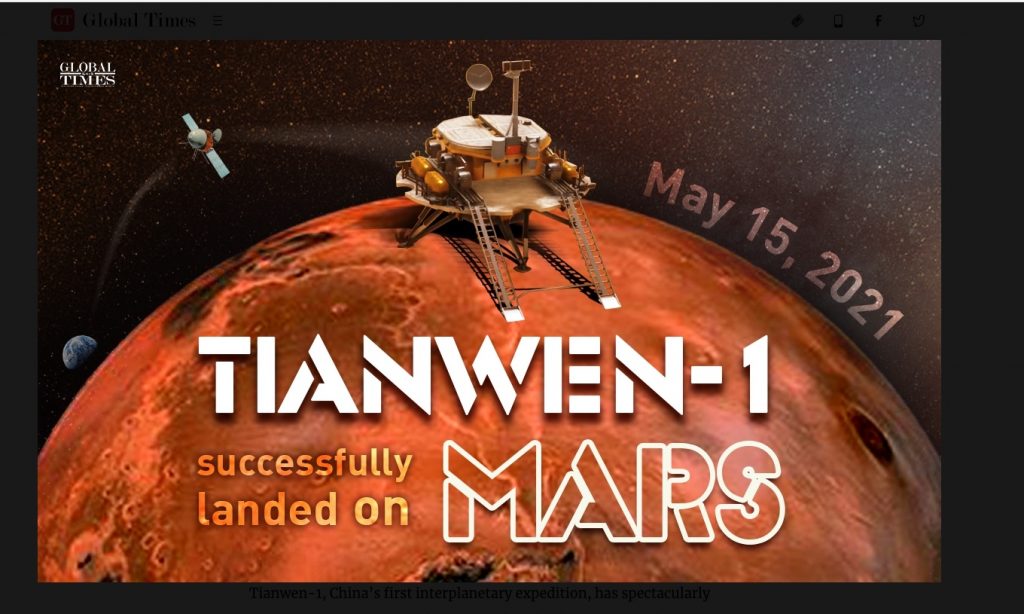
China is militarily much more vulnerable than, say, the US, because at least the eastern part of China is much more densely populated than the still incumbent superpower. A bunker-busting missile on the Sanxia Dam on the Yangtze River – which would admittedly be tantamount to a war crime – would unleash a tidal wave that would even devastate Shanghai with a three-meter-high wall of water.
Is Xi then still a mighty dragon or just an Icarus, like most of his predecessors? To the outside world, the red emperor looks like a victor.
But the supposedly humming economy has long been built on quite a lot of clay. According to the Chinese government, 600 million people have a monthly income of barely 1 000 yuan (155 US dollars). „China is still a poor country, in terms of gross national product per capita it is on a par with Montenegro or Suriname. And wealth is extremely unequally distributed,“ writes the IPG newsletter of the Friedrich Ebert Foundation. „Inequality in China (measured by the Gini coefficient) is similar to that in the US and India. Since China has a population of 1.4 billion, this means that hundreds of millions of Chinese still live in poverty.“
The productivity level of the Chinese economy is only one-third that of the US, according to a World Bank study. Last year, total debt skyrocketed to over 300 per cent of Japanese levels. Particularly worrying is the rapid increase in private debt, which is mainly due to the rise in prices in the real estate sector. A huge bubble has been created. Across the country, more than 100 million flats are empty. Xi Jingping had saved himself from several economic dips with concrete gold.
But, „if China fails to shift from an investment-driven growth model to an innovation-driven model,“ writes Matthias Kamp in the NZZ, „the current locomotive of the global economy could end up in the so-called middle-income trap.“ The decline in the birth rate compounds the problem.
And the Xi regime only wants to allow innovation as long as it serves to maintain its power and enrich the country’s leading families. Those who dare to talk back, like Ma Yun (Jack Ma), the founder of the Alibaba Group, quickly lose their billions and sometimes their freedom. But the inventive spirit needed to rise and outdo the West is not at home in China’s mostly ailing state-owned enterprises, but in creative start-ups and private companies. How long will their actors allow Han chauvinism and prosperity to buy personal freedom and democratic rights?
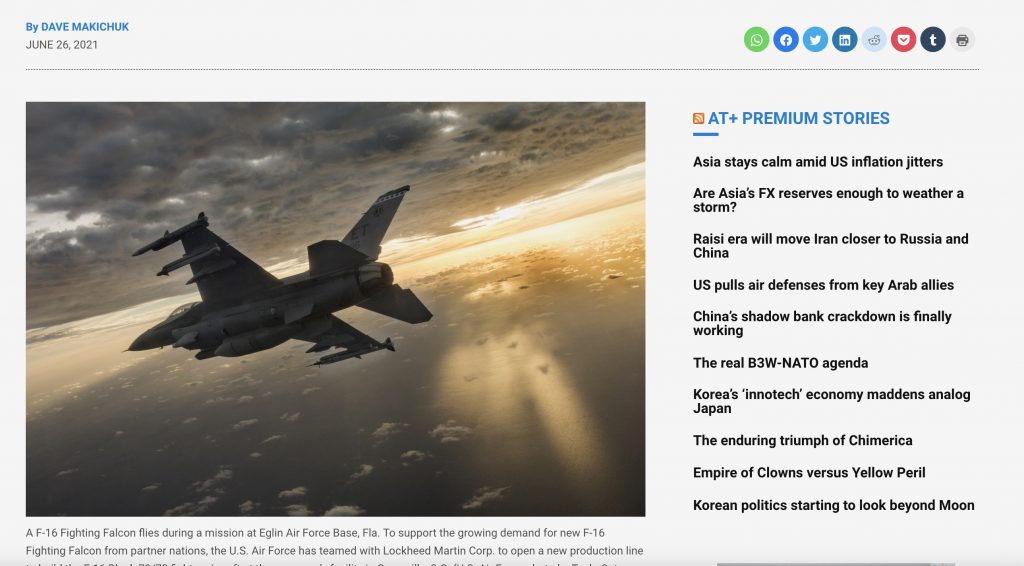
Xi still believes that he can keep spinning the escalation spiral with the West without it harming him? That foreign countries will still come crawling to him when companies like VW and states like Germany, as access to the supposedly irreplaceable Chinese market, have to lick the blood of Tibetans, Uighurs, Hong Kong dissidents and perhaps soon also of the almost 24 million Taiwanese off their boots?
But hasn’t Xi long since overplayed this game? In recent months, shocked by Beijing’s initial cover-up of the Corona crisis, first smaller states like Australia, Czech Republic are no longer dancing to the tune of Papa Xi. The US has formed an alliance with Quad to tame and contain China that would have seemed unthinkable a year ago. A few days ago, for the first time since the end of the Indochina conflict, a French frigate went on manoeuvres right on China’s doorstep with Japanese, Australian and US sailors.
Xi has indeed managed to transform himself from the darling of world politics, the cute Winnie the Xi-bear, to the despised despot one would like to hand over to the International Court of Justice in just a few years.
How long will it take for the business community to change its mind? First the foreign economy and then the domestic, Chinese economy, which will not be helped by a conflict with the West and also the neighboring Asian states?
Sinologist Kirstin Shi-Kupfer provided an interesting thought experiment on Manager-Magazin-Online: „What would it be like if the companies that are most dependent on the Chinese market calculated what it would cost them to open up new markets and secure their supply chains without Chinese partners? And then? „Then the companies present a new Indo-Pacific strategy, flanked and financially supported by politicians in Germany and Europe, to the public. The goal: to set the geopolitical framework for a long-term exit option from China and a turn to other large markets such as India or Indonesia. One should be curious to see the reaction from Beijing.“
This is probably the most interesting and also the boldest impulse to come out of German sinology in the last 20 years. For it goes to the very heart of the dispute. It is not China that has a problem with the West. On the contrary, as long as China aimed to be an equal, halfway reliable nation in the concert of a multipolar world, the West was quick to forgive such gross slips as the massacre in Beijing’s Tiananmen Square.
But Xi Jinping’s ruthless, even neo-fascist policy of world-spanning Han chauvinism without regard for losses cannot be tolerated by any halfway independent nation. Xi’s biggest mistake was to elevate this policy to the status of the ultima ratio of Chinese state action, and to back it up with annual figures like a five-year plan in the days of the communist barrel ideology. He can’t get out of it without losing face. And loss of face in China also means loss of power.
It is only a matter of time before his comrades-in-arms realize that their loyalty to Xi will drag them down with him if he fails. Until now, the party leader had felt quite safe. In recent years, from the Politburo down to the top of the provincial administrations, he has had all perceived opponents removed from office or thrown straight into prison on charges of corruption or other alleged misconduct. But Papa Xi no longer seems quite so sure that he is surrounded only by loyalists.
At the annual gala dinner at the end of the National People’s Congress with foreign diplomats and journalists in March, Xi was seated for the first time this year only surrounded by security guards. (Vienna/ Singapore – June 2021)
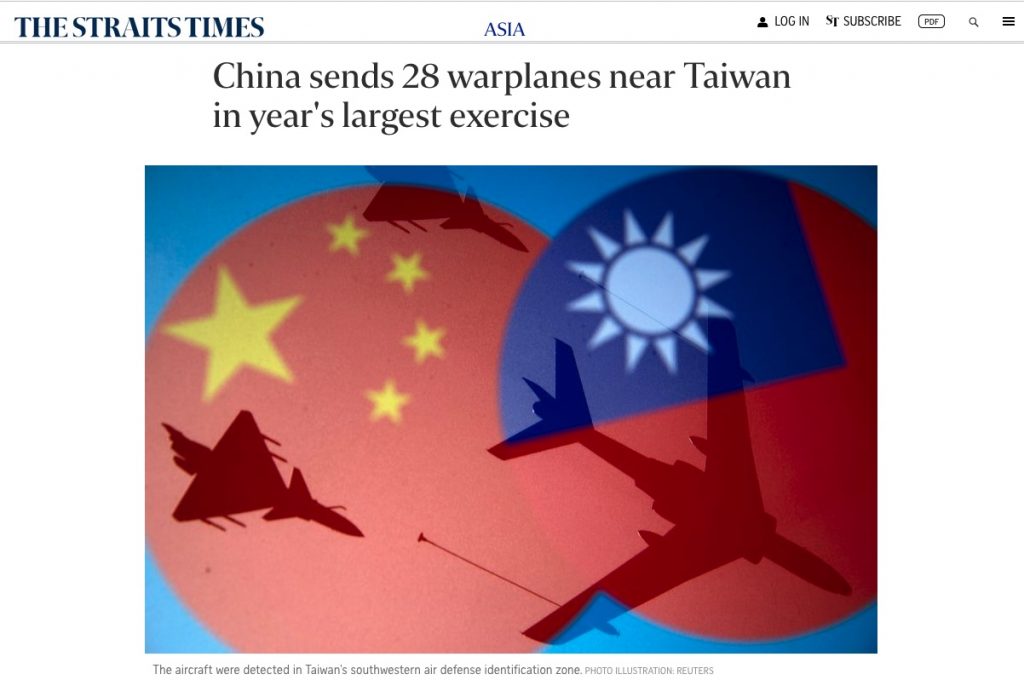
PS: After writing this essay, China again twisted the escalation spiral with the West. In response to the G7 meeting in Cornwall, UK, a total of 28 Chinese fighter jets entered airspace over Taiwan on 15 June. (See screenshot from Straits Times/ Singapore.)
First appeared at: „The Rickshaw Reporter – View on Asia by Jürgen Kremb“ (Der Rikscha-Reporter, Blick auf Asien von Jürgen Kremb), on 17 June 2021 in German language.
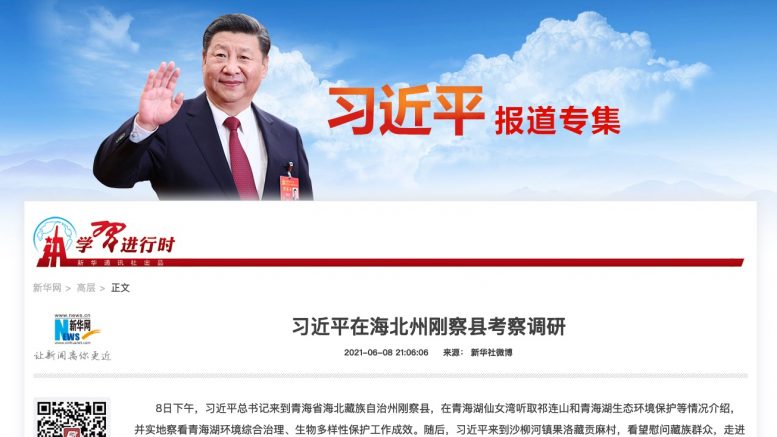

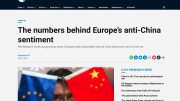
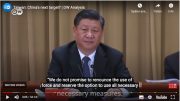

Kommentar hinterlassen zu "National Socialism “Made in Xi-Na”. With his neo-fascist leader cult, China’s CP leader Xi Jinping is destroying all the achievements of his predecessors."